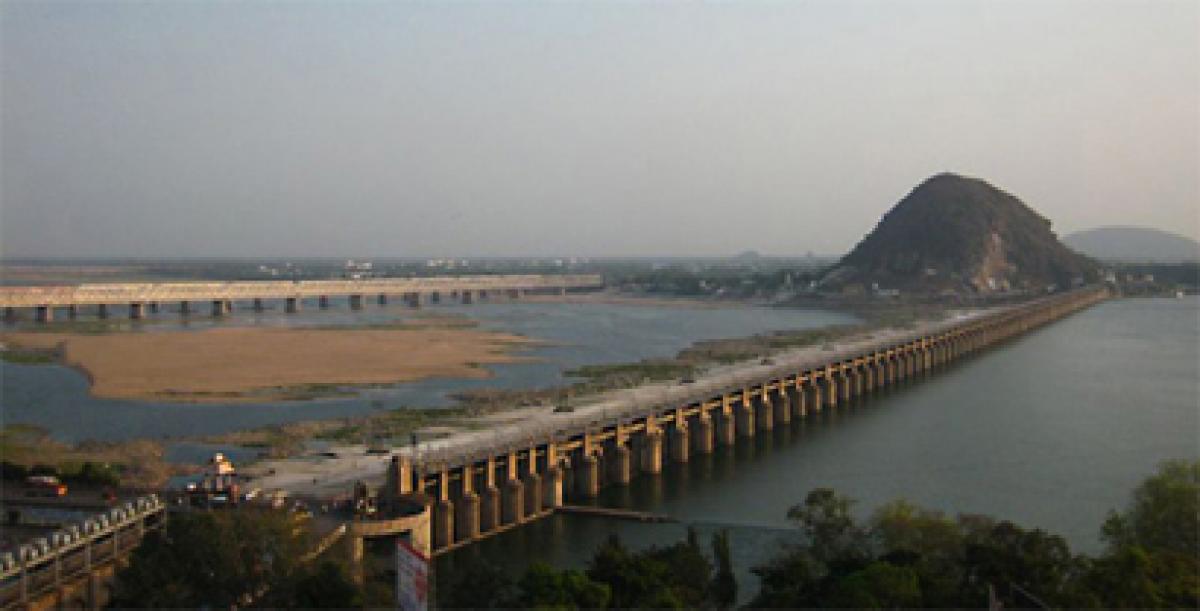Live
- GMR Airports Unveils AI-Powered Digital Twin Platform to Transform Airport Operations
- India poised to become leading maritime player: PM Modi
- Top Causes of Kidney Stones and How to Recognize Silent Symptoms
- India’s renewable energy capacity logs 14.2 pc growth at 213.7 GW
- Winter Session of Odisha Assembly adjourned sine die
- Biden calls Trump's tariff approach 'major mistake'
- After Drama Over Eknath Shinde’s Chief Minister Race, Maharashtra Cabinet Formation Faces New Tensions
- Egyptian FM, Blinken discuss recent developments in Syria
- Iran's supreme leader says Syria's developments result of US-Israeli 'plot'
- Elon Musk to Purchase $100 Million Luxury Mansion Next to Donald Trump's Mar-a-Lago, Report Reveals
Just In
Injustice to Telangana by Karnataka illegal irrigation acts


Agriculture currently produces only below 10% of total income in Telangana, but it remains the basis for survival of nearly 55% of the population. During the 58- year period, 1956-2014 Telangana lost about 3.00 lakh hectares of tank irrigation.
Agriculture currently produces only below 10% of total income in Telangana, but it remains the basis for survival of nearly 55% of the population. During the 58- year period, 1956-2014 Telangana lost about 3.00 lakh hectares of tank irrigation. Meanwhile- both in capital and operating costs – over the same period the area irrigated by tube wells has grown up by 56.11%. The latter is entirely dependent on recharge of ground water and the availability and cost of power.Whatever the future irrigation policy and its implementation, it will need a close ground level, local district and regional governmental efforts in Telangana.
Recognizing the fact, Telangana government proposed the new irrigation policy and irrigation Act that would be introduced during the ensuing budget session of the State Assembly. The budget session of the Assembly will commence in the first week of March,2016.
Unperturbed by criticism against the proposal to redesign irrigation projects, the proposed new irrigation projects would be given a final shape in Telangana after re-engineering and redesigning of the existing projects, as the irrigation projects conceived by the previous governments were not beneficial to the State. In light of this, new irrigation policy would ensure that the State government stores 200 TMC of water in its irrigation projects.
The irrigation Act is also intended to curb the encroachments on major irrigation tanks. The proposed Act will have more stringent provisions to book criminal cases and impose heavy fines on those encroachments of the irrigation tanks.
The encroachments of minor tanks are very high in urban areas, which include Hyderabad and Rangareddy districts. As most of the tanks in the cities are encroached upon and huge buildings were constructed on them, and number of land grabbing cases were filed against the encroachers and the same are pending in LGC courts. To arrest the deficiencies, the proposed irrigation Act will deal on how to remove the encroachments and how to encroachments in future.
The State government is coming out with this Act after its experiences during the ambitious programme “Mission Kakatiya”, which was taken up restoration of 40,000 minor irritation tanks in the State. It is expected that irrigation department may get large chunk of Rs.25,000 crore in 2016-17 budget.
Though Telangana enjoyed a huge part of natural resources, most of the 10 districts of the region cover more than 49% of green cover of Andhra region. But, in water resources it has 68.5% of Krishna basin catchment area, and 78% of the Godavari river basin catchment and the Krishna Water Dispute Tribunal shares water among the states Maharashtra (560 TMC), Karnataka (700 TMC), Telangana (278 TMC) only with 68.5% catchment area, but allocation of water with 34.73% and Andhra Pradesh (522 TMC) with catchment area of 31.5% with allocation of water of 48.5%.
Meanwhile, the Telangana government sought the intervention of the Centre in the alleged illegal and unauthorized irrigation projects being undertaken by neighboring states of Karnataka, Maharashtra and Andhra Pradesh.
Telangana State is in a hapless situation, as Karnataka government is going ahead with the illegal constructing several minor barrages in the name of road-cum-bridges across Krishna and Bhima rivers obstruction the flow of water to downstream states. It is also going ahead with the illegal construction of gated barrage on the upstream of confluence of Krishna and Bimha Rivers near Girjiapur in Raichur district without Detailed Project Report (DPR).
Both Telugu States are facing water woes ever since Karnataka constructed Almatti barrage on river Krishna, Karnataka has also decided to increase the height of the Almatti dam from the present 519 metres to 524.46 (1720 ft) to utilize further quantum of 54 tmc. Moreover, Karnataka has already constructed around 10-road-cum-bridges to divert around 100 tmc Krishna and Bhima waters.
If these road-cum-bridges across Krishna River were not stopped, districts such as Mahbubnagar, Nalgonda, would suffer from lack of irrigation and drinking water and agriculture would be affected badly.
However, Telangana is hapless over the Karnataka’s new barrages and storing water in the name of road connectivity stated Telangana in a letter to the Centre. Despite of knowing the fact, the Centre too will not interfere as water is a State subject.
Meanwhile, Telangana government also took exception to Andhra Pradesh allegedly preparing a DPR for construction of right main canal to Rajole Diversion Scheme (RDS) project through the AP Reorganization Act stipulates that permissions need to be obtained from Krishna River Management Board (KRMD) for any new projects.
It also urged the Centre and Central Water Commission to see that the AP government does not continue the works allegedly without permission of KRMD.
G.Rajendera Kumar

© 2024 Hyderabad Media House Limited/The Hans India. All rights reserved. Powered by hocalwire.com






